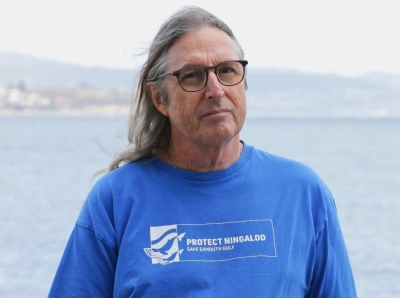The exceptional, wild Ningaloo
Ningaloo is a place that's essentially an exception in the north-west of Western Australia. WA is a petro (petroleum) state, it's a quarry. Most of the northern and coastal landscapes around the Pilbara are radically transformed by the resources industry. Ningaloo is the exception. It is one of the last wild intact places on the planet.
In one day you'll be able to experience more species of megafauna than anywhere else in the world and that includes the Serengeti. So it's a pretty exceptional place.
That's why we've spent half our adult lives defending it and celebrating it studying it and trying to get more protection for it. I think there's always a tension between celebrating a place and protecting it.
You have to make serious decisions about management. But one thing we have found with ecotourism in particular, is that it can be managed in a way that say, hard infrastructure or heavy industrial uses can't be managed.
Once they go in, the place is altered forever.
If you feel like you've got too much visitation, or too much of one kind of visitation to a beautiful place, you have the capacity to dial that back and you have the chance to educate people about how and when they go into those places.
I think that's the part that makes them more sustainable. You know, once you build a deep water port or a quarry or a salt mine, that's it, that place is over.
Whereas we have found that for certain forms of tourism, places can respond and regenerate and recover, even if we make mistakes there.
--
You can watch it on ABC iview .
You can find out more about the Australia Marine Conservation Society's Ningaloo campaign here .
(feature image: Dylan Shaw)

Tim Winton
Ningaloo is a place that's essentially an exception in the north-west of Western Australia. WA is a petro (petroleum) state, it's a quarry. Most of the northern and coastal landscapes around the Pilbara are radically transformed by the resources industry. Ningaloo is the exception. It is one of the last wild intact places on the planet.
In one day you'll be able to experience more species of megafauna than anywhere else in the world and that includes the Serengeti. So it's a pretty exceptional place.
That's why we've spent half our adult lives defending it and celebrating it studying it and trying to get more protection for it. I think there's always a tension between celebrating a place and protecting it.
You have to make serious decisions about management. But one thing we have found with ecotourism in particular, is that it can be managed in a way that say, hard infrastructure or heavy industrial uses can't be managed.
Once they go in, the place is altered forever.
If you feel like you've got too much visitation, or too much of one kind of visitation to a beautiful place, you have the capacity to dial that back and you have the chance to educate people about how and when they go into those places.
I think that's the part that makes them more sustainable. You know, once you build a deep water port or a quarry or a salt mine, that's it, that place is over.
Whereas we have found that for certain forms of tourism, places can respond and regenerate and recover, even if we make mistakes there.
--
You can watch it on ABC iview .
You can find out more about the Australia Marine Conservation Society's Ningaloo campaign here .
(feature image: Dylan Shaw)
You might like...

Tim Winton: his new novel and our climate emergency

Tim Winton: coastal Perth childhood

From surfing came a love of the ocean

Bruny Island launch: Bob Graham on the hidden world behind the photos
Newsletter
Sign up to keep in touch with articles, updates, events or news from Kuno, your platform for nature
